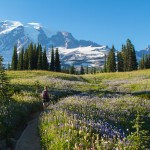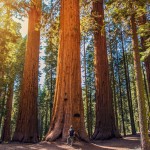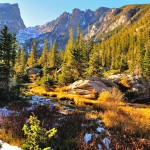What is a Park Ranger?
For many, the term “park ranger” evokes the image of an officer working in nature amongst grizzly bears, elk and other wildlife. While this characterization is accurate, it only paints part of the overall picture. Park rangers do much more than just observe, track and protect wildlife. A park ranger is responsible for a broad range of duties- similar to that of a fish and game warden, conservation officer, or wildlife resource manager, but within the defined area of a state or national park.
Park rangers are considered peace officers, which means they are authorized to carry a weapon and make arrests. A park ranger’s primary duty is to protect parks from those who would do damage to them, to enforce recreational, hunting, and environmental regulations, and to protect visitors in the park from wildlife and other dangers.
Park Ranger Job Description- Major Job Duties
A park ranger may perform a number of different duties. Some of these duties vary depending on where the park ranger works, while others vary from position to position. Those who work for the federal government are often more focused on the law enforcement side of being a park ranger, while those who work in state parks may focus more on wildlife and on public relations. Here are some common duties that many park rangers have:
- Enforcing Park Regulations and Laws – Park rangers have a duty to uphold and enforce all laws—even those that do not pertain to parks. However, they usually only enforce park regulations unless they come across an illegal activity in a park. They do carry firearms and are trained to defend themselves.
- Write Citations, Issue fines, and Make Arrests – Likewise, park rangers are empowered to write fines, confiscate hunting/fishing licenses, and make arrests whenever the situation calls for it.
- Investigate Criminal Cases – Federal park rangers may train to be special agents. These agents work for the U.S. National Park Service and conduct investigations into criminal activity that takes place in national or state parks.
- Collect Evidence and Provide Testimony – When a park ranger makes an arrest, they often have to appear in court to provide testimony. They are also in charge of collecting any evidence at the crime scene and are trained in how to do so without contaminating the evidence.
- Assist Park Visitors – Park rangers provide information, directions, and help to those who are visiting the park. This includes assisting them with camping activities (in parks where camping is allowed) and more. Park rangers are expected to be knowledgeable about the park they are assigned to.
- Provide Education – Park rangers may work in the visitor’s center and help educate guests on how to protect the environment, tell them about the park, and more. Rangers may also go to local schools or other organization meets and do presentations on local wildlife, conservation methods, and nature.
- Patrol the Park – Rangers often spend time outdoors patrolling. These rangers are looking for litter, illegal hunting, wounded animals, lost children, and hurt visitors. They may need to provide emergency first aid when needed.
- Search and Rescue – If someone is lost in the park, park rangers are often the first to respond. They will work with other law enforcement as necessary to make certain the lost person is found.
- Evacuating and Closing the Park – Park rangers are charged with finding everyone in the park and getting them to safety in the event of a forest fire, tornado, flooding, or other natural disaster.
- Administration – Those who work in the visitor’s center may also handle daily administrative tasks, work as a dispatcher for other rangers, and perform other tasks as needed.
Park rangers often have tasks that change with the seasons. In the spring, for example, they may inspect trails and prepare campsites, while in the fall, they may cut back plants or prepare buildings and areas for the winter.
Typical Work Settings for Park Rangers
Park rangers, as one would guess, work primarily in a state or national park. However, they may also work in private parks. Those who do will find that their duties are very similar to park rangers who work for the state or federal government. Park rangers who have become special agents may travel across the country, while other federal park rangers may travel throughout a region. Others work in a single national park, much like how state park rangers work in a single park.
Working Conditions
Park rangers may often work outdoors and on their own. They may work in the freezing cold and in extreme heat, plus they may be asked to go out during snowstorms and thunderstorms to check on visitors or to bring them to a shelter. During a major natural disaster, park rangers are the last people out of the park after they have made certain that everyone is safely out of the area.
Some duties will take the park ranger indoors. Working in the visitor’s center, giving educational presentations, or testifying in court will all require park rangers to work indoors.
Education and Experience Requirements for Park Rangers
The educational requirements for working as a park ranger depend on what type of position you want. If you’re applying for a state position, you may find that all you need is an associate’s degree if you want to primarily work in the visitor’s center or give guides. However, if you want to serve as a full law enforcement park ranger, you may need a bachelor’s degree. If you want to work for the National Park Service, especially if you want to become a special agent, a bachelor’s degree is a necessity.
But what do you need to study? There are many different fields you can go into. Generally, you want to study something that is connected to the duties of a park ranger. Studying biology, wildlife conservation, botany, earth science, criminal justice, public administration, archaeology, and anthropology can all be good options. It all depends on what type of park ranger you want to be. Again, those who want to join the National Park Service may want to focus on criminal justice since national park rangers often do more law enforcement work.
State park positions are often arranged on tiers. The lower tiers may require only an associate’s degree. These bottom level park rangers often perform only basic duties. Those who have experience in law enforcement may be able to substitute that experience for education. Those with a four-year degree can come in at a higher level. One advantage of this is that those with associate’s degrees can begin gaining experience while they work on their bachelor’s.
Supervisory positions often require a master’s degree or years of experience.
Examination, Entrance and Training Requirements
In order to become a park ranger, you may have to pass a written and/or oral exam. The exam varies from state to state, but in most, it involves showing that you can communicate effectively, that you understand many of the basic duties of a park ranger, and that you can demonstrate basic problem-solving skills. You may also need to pass a physical exam that includes vision and hearing tests, plus a stamina requirement—some departments require their park rangers to be able to run a mile in a certain amount of time or to swim a certain distance.
Once a park ranger has been hired, they will go through training. This training course varies from state to state. The training a park ranger receives also depends on the job they will do. Those who will provide law enforcement will need to be trained on how to enforce laws and will have to go through a gun safety course. Those who will mostly serve as guides or work in the visitor’s center may be trained in the areas of record keeping and public relations. Most park rangers will go through a basic first aid and CPR course.
In some areas, park rangers will also be trained in how to drive ATVs, boats, planes, or snowmobiles.
Those who get hired by the National Park Service will receive training at one of three different training courses. They may also need to complete the Seasonal Law Enforcement Training Program.
Important Resources
Finding resources, support and networking opportunities is an important part of career advancement and wellness in any field. It is especially important for park rangers and their counterparts in law enforcement to make connections with organizations and associations who directly support their work, and provide support for them in areas of advocacy and training. Listed below are several notable organizations who offer a range of services for park rangers and members of the law enforcement community:
| Association/Organization | Contact Information |
|---|---|
| ANPR Business Office P.O. Box 984 Davis, CA 95617 | |
| P.O. Box 153 Stewarts Point, CA 95480 (707) 884-3949 | |
| P.O. Box 3212 Bowman, CA 95604-3212 (530) 305-1166 | |
| P.O. Box 1481 Twain Harte, Ca. 95383 (800) 407-08295 |











